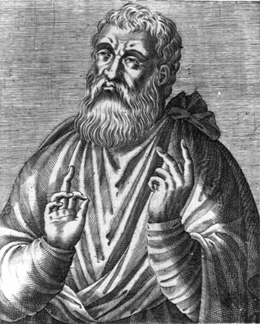Justin Martyr
Justin Martyr (Justin of Caesarea) was an early Christian apologist (a person who defends the truth of Christianity). His works represent the earliest surviving Christian apologies of notable size. He lived from around 100 AD to 165 AD.
| Justin Martyr | |
| RELATED TOPICS | |
| SERMONS, ESSAYS AND OPINIONS |
|
| CONTENTS | |
Contents
Life
Most of what is known about the life of Justin Martyr comes from his own writings. He was born at Flavia Neapolis (modern Nablus) in Palestine. The city had been founded by Vespasian in the aftermath of the destruction of Jerusalem in 70 AD. According to church tradition Justin suffered martyrdom at Rome under Marcus Aurelius when Rusticus was prefect of the city (between 162 and 168).
Justin Martyr called himself a Samaritan, but his father and grandfather were probably Greek or Roman, and he was brought up a pagan. It seems that he had property, studied philosophy, converted to Christianity, and devoted the rest of his life to teaching what he considered the true philosophy, still wearing his philosopher's gown to indicate that he had attained the truth. He probably travelled widely and ultimately settled in Rome as a Christian teacher. While he was at Rome, he debated opponents of his belief, such as Crescens the Cynic. He was later executed in 165 A.D. for his no-compromise faith in Christianity.
Writings
The earliest mention of Justin is found in the Oratio ad Graecos by Tatian who called him "the most admirable Justin,". Tatian quoted a saying of his, saying that the Cynic Crescens laid snares for him. Irenaeus (Haer. I., xxviii. 1) spoke of his martyrdom, and of Tatian as his disciple; he quoted him twice (IV., vi. 2, V., xxvi. 2), and showed his influence in other places. Tertullian, in his Adversus Valentinianos, called him a philosopher and martyr, and the earliest antagonist of heretics. Hippolytus and Methodius of Olympus also wrote about him. Eusebius of Caesarea dealt with him at some length (Church History, iv. 18), and named the following works:
- The First Apology addressed to Antoninus Pius, his sons, and the Roman Senate;
- A Second Apology addressed to the Roman Senate;
- The Discourse to the Greeks, a discussion with Greek philosophers on the character of their gods;
- A Hortatory Address to the Greeks;
- A treatise On the Sovereignty of God, in which he makes use of pagan authorities as well as Christian;
- A work entitled The Psalmist;
- A treatise in scholastic form On the Soul
- The Dialogue with Trypho
Quotes
The first apology of Justin, chapter LXVII. In ANF1, that is, Roberts A, Donaldson J and Coxe AC (1885) Ante-Nicene Fathers, Vol 1, at Christian Classics Ethereal Library. Quoted by Kidd BJ (1920) Documents illustrative of the history of the church: Vol I: To AD313. [c 156 AD.]
- But Sunday is the day on which we all hold our common assembly, because ... Jesus Christ our Saviour on the same day rose from the dead. For He was crucified on the day before that of Saturn (Saturday); and on the day after that of Saturn, which is the day of the Sun, having appeared to His apostles and disciples, He taught them these things, which we have submitted to you also for your consideration.
The first apology of Justin, chapter LXVIII. c 156 AD. In ANF1, that is, Roberts A, Donaldson J and Coxe AC (1885) Ante-Nicene Fathers, Vol 1, at Christian Classics Ethereal Library. [Justin quotes from a letter of the Emperor Hadrian to Minucius Fundanus. Hadrian was emperor from 117 to 138. ANF1 footnote: "Generally credited as genuine."]
- "If, therefore, any one makes the accusation, and furnishes proof that the said men [Christians] do anything contrary to the laws, you shall adjudge punishments in proportion to the offences. And this, by Hercules, you shall give special heed to, that if any man shall, through mere calumny, bring an accusation against any of these persons [Christians], you shall award to him more severe punishments in proportion to his wickedness."
Dialogue with Trypho, chapter CII. In ANF1, that is, Roberts A, Donaldson J and Coxe AC (1885) Ante-Nicene Fathers, Vol 1, at Christian Classics Ethereal Library. [c 160 AD.] [Cf chapter LXXXVIII.]
- But yet, since He knew that it would be good, He created both angels and men free to do that which is righteous, and He appointed periods of time during which He knew it would be good for them to have the exercise of free-will; and because He likewise knew it would be good, He made general and particular judgments; each one’s freedom of will, however, being guarded.
Dialogue with Trypho, chapter CXVII. In ANF1, that is, Roberts A, Donaldson J and Coxe AC (1885) Ante-Nicene Fathers, Vol 1, at Christian Classics Ethereal Library. [c 160 AD.] [ANF1 footnote: "Note this testimony to the ... Church in the second century...."]
- For there is not one single race of men, whether barbarians, or Greeks, or whatever they may be called, nomads, or vagrants, or herdsmen living in tents, among whom prayers and giving of thanks are not offered through the name of the crucified Jesus.
External Links
Note to users: The wiki is currently operating in safe mode. Editing is limited to users with certain privileges in order to deal with spam. You can create a new user account, and confirm your email ID in order to obtain ability to edit pages. Learn how to be an editor or sysop at WikiChristian.
- Sister projects: WikiMD.com Wellness Encyclopedia & Directory
- Sponsors: WikiChristian is supported by W8MD's medical weight loss and sleep centers.

